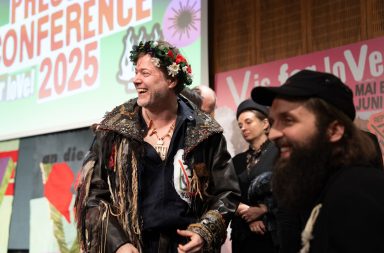Neil LaBute (born in 1963) is a director, a screenwriter and one of the most controversial and innovative American playwrights. Critics respond to his plays as having a misanthropic tone, Rob Weinert-Kendt referred to LaBute in The Village Voice as “American theatre’s reigning misanthrope”. Neil LaBute is one the world’s most staged playwright, his plays are translated and staged extensively in the United States of America and Europe. He wrote the script for several feature films and for some short films. In 2013, LaBute receives the Literature Award of the American Academy of Arts and Letters. In 2023, he becomes a Fellow of the International Association of Theatre Leaders (IATL).
Neil LaBute received in 2015 a star on the Walk of Fame from Sibiu for “his unique ability to surprise and amaze the world of theatre and film, as well as for his strength to inspire and educate the young generation”(Constantin Chiriac).
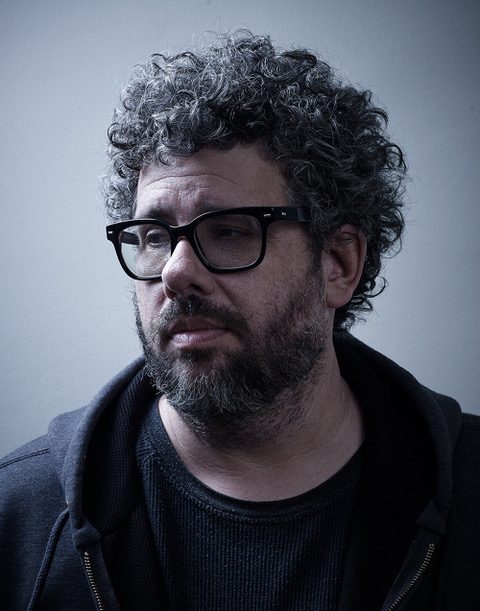
Anca Mureșan: We asked Mr. Neil LaBute to tell us some words about the process of directing “Uncle Vanya”, an adaptation of Chekhov’s play, on the stage of the “Radu Stanca” National Theatre in Sibiu.
Neil LaBute: I felt very lucky to have been given the chance to work on one of my favorite plays from my own adaptation — Uncle Vanya—and to get to do it in a city that i had come to love — Sibiu— and with a group of people whom i already admired but grew to feel as if they were part of my own family. The great Constantin Chiriac opened the doors to his Radu Stanca Theater very wide and asked me to work with his wonderful company of actors (and other stage artists) so that we could create something special, with a bit of me in it and a bit of them as well.
From my side at least, I felt like the collaboration was a perfect blend of techniques and practices that work for me as a writer/director and embracing what I didn’t know about working with a theater that utilizes the same actors throughout the year in many different roles. It was fascinating to see how they operate together, as friends and colleagues and artists and to have me come in and say “I want your imput, this isn’t just about how I see this play or these parts, I want you to actively have imput into this and to tell me if you like it or don’t like it or, most importantly, how we can make it the best that it can be.”
Ultimately I had a cast who accepted this approach — different from what I think they are usually used to— and together we created a shared experience that I am very proud of. I was also given the gift of an actor from outside the company in one role, which I feel helped add enough difference to the experience as to make it even more intriguing and a scenographer — Oana Micu — who brought the visual elements of the play to life in such a brilliant way that I was constantly in awe of her. I can’t say enough about her work and the actors on the stage; I think we created something very special by doing what people are supposed to do in the arts but don’t always do: work together.
AM: Your plays often explore themes of human relationships, lack of morality and the darker side of human nature. What inspires you, what draws you to these subjects?
NLB: My job is to create conflict; my work on stage is to bring people together or to tear them apart—sometimes in the same play—and to make it as big and brash and messy as possible. People don’t go to the theater, or to my work at least, to see a documentary, they want me to tell them a story they haven’t seen before, one that might not even be possible in real life, but to make it seem possible and to do it in an entertaining way.
That’s the contract between myself and any audience. I don’t want things to be ’nice;’ ’nice’ is boring, ’nice’ is not going to take me on a breathless ride for two hours in the dark. I think the stage has become too much of a ’safe space’ lately — at least in the United States — and I think it should be a ‘bold place’ where we can write about anything and ask any questions we want to as long as we do it well. People can be wonderful and they can be awful; there are lots of places you can go to see wonderful people and stories depicted, so I prefer to examine the darker stories and the gray areas that exist between us.
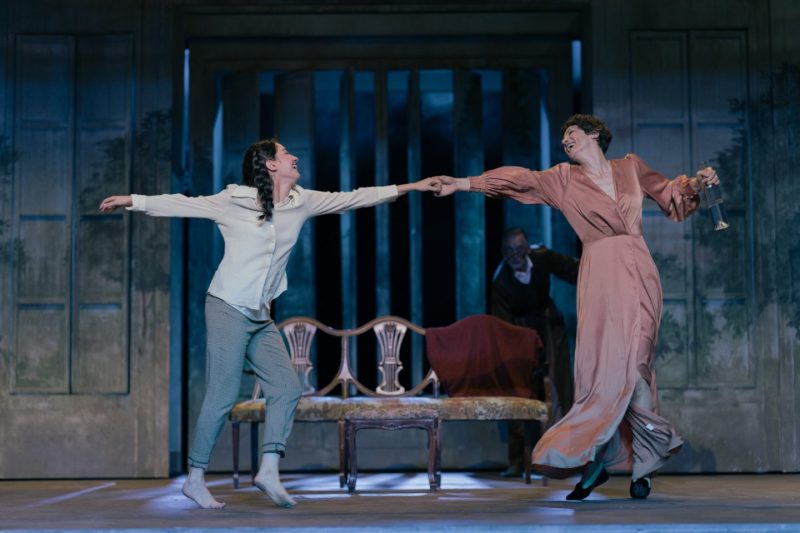
AM: How do you balance the ugly realities portrayed in your work with moments of humour or irony? In other words, what do you expect most from someone who see a play or a movie: to laugh or to be horrified/horripilated?
NLB: I just want an audience to go for a ride with me, to agree that I’m going to tell them a story or have a take on a kind of story that will feel new and unique and fun instead of like something they’ve already heard before. Even with Uncle Vanya, we approached the play as something new and tried to find ways to play the characters and block the scenes (and even fabricate a new kind of ending) that felt surprising and different to us. Chekhov has always mixed the dark and the light, pain and laughter, so well in his work and I admire it and also try to do the same with my own work. Humor is rarely used in a better way than when it sets an audience up for the next moment; we laugh and then we don’t see the punch in the gut that is coming around the corner. Our own lives are full of this kind of push and pull, highs and lows, and it feels right and useful to utilize those same techniques on the stage.
AM: Sometimes, your characters are unlikeable. I read that In the company on men is on the list of “The 25 Most Dangerous Movies” and Aaron Eckhart once said that he was slapped at theatre by an angry woman from the audience who affirmed that she hate him (cf imdb.com). Do you believe the public need to identify with characters to connect with a story?
NLB: I do think that stories are best told through characters that we can connect with but not only with characters that we ‘like’? I often cringe when i hear someone ask that about a play or film of my own or someone else’s: ‘who am I supposed to like’? Personally I don’t care if you ‘like’ anybody, I just want you to find them interesting enough to keep watching to find out what happens to them. To me that’s what is at stake in storytelling, that you can create fictional people who are believable enough and full of enough life and on a satisfying enough quest — which can be very honorable or the complete opposite — that an audience member keeps asking that fundamental question: “what’s next?”.
I don’t care if you like them; I don’t care if you want to marry them or you hate them or you land somewhere in between. Are my characters watchable? Are my characters compelling? Do you care enough to keep watching? Those are the things that matter to me and the things that the playwrights I admire are capable of doing. Would I really want to spend an evening with George and Martha? Would I care to stand under that tree and wait with Didi and Gogo? Would I really like to work for Marlene at her employment agency?
That’s not the point —I want to see what happens to those people in their individual stories and that’s what matters to me as a writer and as a viewer of someone else’s play. You ask about the character of Chad in my In the company of men and I’ll say this: people have loved him and hated him and on and on but nobody said he wasn’t worth watching.
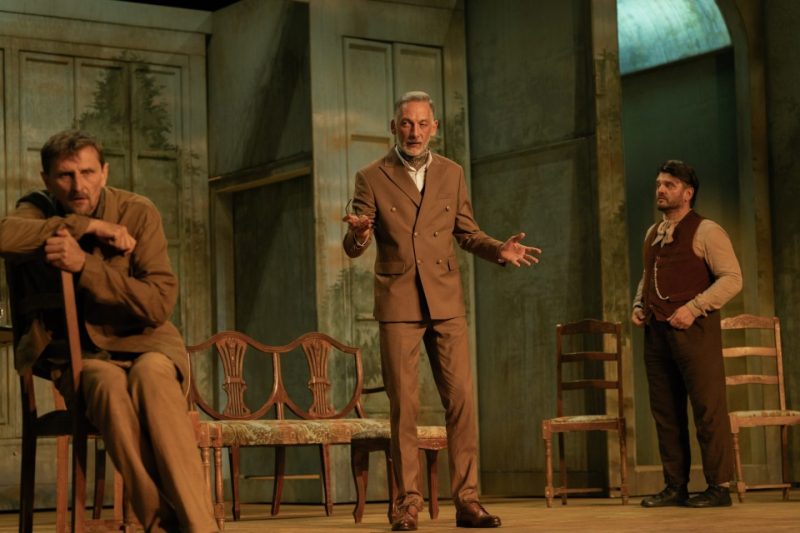
AM: Some critics have noted the misogyny present in certain characters and narratives in your work and speak about a misanthropic tone. How do you respond to these critiques?
NLB: Yes, I have also noticed that. I bristle at the word ‘misogyny’ but I am more comfortable with the word ‘misanthropic’. I have written a lot of plays and films and some have fit that description and others not at all so I don’t worry about it too much; I keep doing my work and let the critics do their work and leave it to the audiences to decide what they agree or disagree with. I know I’d much rather be a writer and a director than a critic so that’s where I leave it. I get my chance to say what I think through my work and critics get their chance to do the same in a newspaper or online and only years from now will we be able to see which of these things have any lasting power, if any. My world is a creative one and their world is a reflective one; I find my world much more satisfying to be a part of. Does that sound misanthropic? Maybe.
AM: If the artist is the voice of the present, how do you see your work reflecting or commenting on contemporary issues?
NLB: I don’t know if I agree that artists are the voice of the present, surely that’s a part of it but we also comment on the past and even on the future at times, so what voice does that really make us? Just a voice, calling out in the darkness of the stage or screen, with hopefully something to say and it’s up to the audience to join in or not show up. I know I’m not a very political writer since I feel like I’m at my best when dealing with universal themes and not more specific ones; I usually don’t start my work from a theme or with ’something important’ to say.
I find some characters out there, a way into a story that is percolating in my head, and I follow them to their natural conclusion whether it’s happy or sad or a mix of the two. I do know that I always feel more beholding to my characters than I do to an audience and that’s probably why some people think I write unhappy endings or less than satisfying ones; sometimes it just feels false to wrap up a script in two hours for the sake of the audience when I know that the story will go on, long after the lights have faded on the stage or the screen.
AM: Your writing frecquently incorporates witty dialogue and sharp observations about human behaviour. How important are dialogue and language in development of subjects?
NLB: Dialogue is king and queen and everything in between to me; it’s the way I tell my stories and where I feel most at home and at my best. You’ll find very few stage directions in my work compared to a lot of other writers and I’m just fine with that. ‘Whatever works’ is my motto in life and at work and this is what works for me. This is why I’ve written 30 plays and 15 movies and just one book of short stories (and no novels). I love good talk, in my own life, in my own work and in the work of others. I grew up in a very repressed family in many ways, we weren’t encouraged to speak our minds or make ourselves heard — ‘children should be seen, not heard’ — so maybe this is me getting it all out in the second half of my life. Either that or I just have a big mouth, which could easily be the case.
AM: How do you perceive the concept of gratitude, especially in the context of the festival’s theme, ”Thank you”? What does this word represent for you personally?
NLB: Gratitude is such an important thing and the sharing of the gratitude can never be done too often or too loudly. I think it’s so important to give people credit for what they do and to only take credit for what you do — this applies to my art and my life — and it’s easy to forget that, to forget a ‘please’ and a ’thank you’ or to misrepresent your work or that of other people. In the movies, people can be very stingy with handing out credits on the screen and I am the exact opposite; I want people to get what they are deserving of and I’m not afraid to acknowledge where a good idea has come from. You can say ’thank you’ for nearly everything in life and it shouldn’t bother anyone to hear it. The same for ‘please’.
I am hugely thankful to have worked in Sibiu and to have been given some wonderful opportunities to present my work at the National Theatre there over the years. When I say the words ’thank you’ in return I try to say them often and loudly, which is a way for anyone to know exactly how I feel about the place and my various experiences there. ’Thank you’ is not a time to be timid.
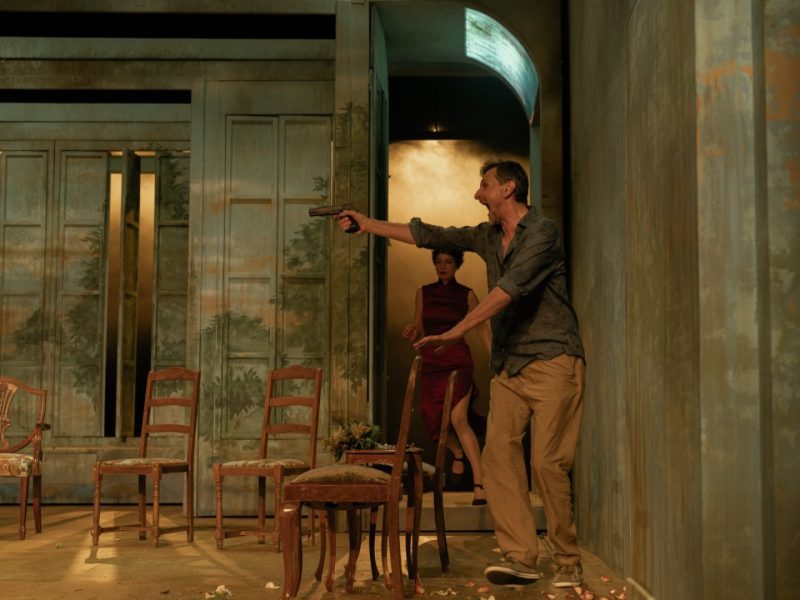
AM: Chad, the main character from ”In the company of men”, said that the key of universe is ”never lose control”. Do you agree? And what makes you losing control?
NLB: I agree that Chad believes in the idea of never losing control but I wouldn’t believe a word that comes out of his mouth — that character is a sociopath and would say anything to anyone to get what he wants in any given moment. I do believe ‘control’ is key to his life and how he survives but it is of little real interest to me as a person. I’m probably the opposite. I can’t say that as a person I lose control very often but I’m not afraid of the idea; things that I love and help me lose control are a good book (Hemingway) or a great performance (Streep), perfect music (Nirvana) or an exciting sports match (tennis or F1) but I think these are all positive losses of control. On the negative side would be inanimate objects that won’t bend to my will or get out of my way. What can I say? We all have our quirks.
Credit photo: Andrei Văleanu, TNRS
